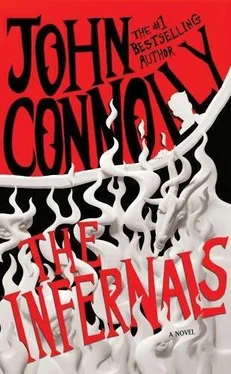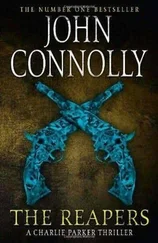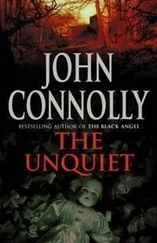But now Nurd had brought the car to a halt and was staring into the distance in the troubled manner of someone who thinks he may have left the gas on even though he can’t remember ever owning a gas oven.
“Master?” said Wormwood, by now growing concerned.
Nurd’s brow furrowed, and a single tear rolled down one of his cheeks as he whispered softly:
“Samuel?”
Mrs. Abernathy was not the only denizen of Hell who had been changed by experiencing the world of men at first hand. Nurd, too, had been altered. To begin with, he was a little kinder to Wormwood than he had been before, and not only because Wormwood knew how to keep the car running. During the long period of his banishment, Nurd had spent a lot of time moping, complaining, and generally bemoaning his lot in life. When he wasn’t doing that, he was usually hitting Wormwood on the head for being annoying. But since his return to Hell he had started to view Wormwood as, for want of a better word, a friend. Admittedly he might have preferred a friend who wasn’t as prone to waving a finger under Nurd’s nose and inviting him to look at what had just been excavated from some orifice of his body, but beggars can’t be choosers.
Similarly, Nurd had abandoned any ideas of ruling another world or becoming a serious demon; not that he’d ever been very keen on that to begin with, but he had now dispensed with his self-invented title “Scourge of Five Deities” and had decided not to go looking for any other demon’s job 24as he was much happier not bothering anyone at all.
But, crucially, Nurd had also brought back with him a deep psychic and emotional connection to Samuel Johnson, the first person who had ever been kind to Nurd, and the first friend that Nurd had ever made. Had they lived in the same world, they would have been inseparable. Instead they were divided by time, and space, and the difficulties of crossing between worlds and dimensions. Despite all of those obstacles, each had held the memory of the other in his heart, and there were times as they slept when it seemed to them that they spoke to each other in their dreams. Not a day went by when one did not think of the other, and such feelings have a way of transcending the barriers that life may put in the way of people. An invisible energy linked these two beings, the boy and the demon, just as it connects all those who feel deeply for another, and the nature of that link had suddenly been altered for Nurd. He felt it more intensely than ever before, and he knew at once that Samuel was near. He was in this world, in this foul place where all things were said to reach the end of hope. But that was no longer true, for Nurd now had hope of better times, of a better way of existing, and it was Samuel who had given it to him.
Yet if Samuel was here, then it could not be of his own will. Nothing came to Hell willingly. Even the entities trapped there wished to be elsewhere, or to cease to exist at all, for that would be infinitely preferable to an eternity spent in the abyss.
Mrs. Abernathy had been hunting, unknowingly, for Nurd, the mysterious driver of the car that had brought an end to her master’s hope of escape, but Nurd knew that Samuel was the greater prize she sought. Somehow she had found a way to bring him here. For all Nurd knew, Samuel might already be her prisoner, and he had a terrifying vision of his friend, chained and bound, being brought before the Great Malevolence himself, there to be punished for his part in all that had occurred. But even if Samuel were not yet in Mrs. Abernathy’s clutches, there were plenty of other foul beings in Hell who would relish the chance to taste a human child. Someone would have to save Samuel, and that someone was Nurd.
Except Nurd didn’t have much experience of saving anyone, apart from Nurd himself, and he was having enough difficulty keeping himself from becoming Mrs. Abernathy’s prisoner without trying to prevent the capture of someone else. He also didn’t consider himself particularly bright, or brave, or cunning. But like most people who think that way, Nurd was a lot smarter, and braver, and cleverer than he realized. He simply hadn’t been given much opportunity to prove it to himself, or to others.
“Master?” asked Wormwood, for the third time, and on this occasion he received an answer.
“Samuel is here,” said Nurd. “We have to find him.”
Wormwood didn’t look surprised. If his master said that Samuel, whom Wormwood had never met but about whom he’d heard a great deal, was somewhere in Hell, then Wormwood was happy to believe him. On the other hand Wormwood did look a bit startled when Nurd turned the car a hundred and eighty degrees so that it was facing in the direction from which they had just come.
“Er, Master,” he said. “You told me that way lay misery, torture, poor food, and certain dismemberment at the hands of Mrs. Abernathy.”
“I did indeed, Wormwood, but only Mrs. Abernathy could have brought Samuel here, so wherever she is, that’s where he will be too.” He put his foot down and gunned the engine. The car lifted slightly, like a horse yearning for the start of a big race. Then Nurd released the brake, and they were off.
Wormwood looked at his master in awe. The old Nurd had been cowardly, self-serving, and determined to avoid personal injury at all costs. This new Nurd was courageous, selfless, and apparently keen to have his limbs separated from his body as soon as possible.
On reflection, thought Wormwood as they sped toward their destiny, I think I preferred the old one.
In Which Dozy Is the Bearer of Bad News
JOLLY WAS JUST WAKING up when Dozy got back to the van.
“’S’matter,” said Jolly, rubbing his forehead in a pained manner. “What did we hit?”
From the back of the van Dozy heard assorted mutters, yawns, and unpleasant bodily noises as Angry and Mumbles emerged from the land of Nod.
“Listen to me carefully,” said Dozy. “Precisely which exit did you take from the motorway?”
“Huh? The Biddlecombe exit. I mean, we agreed.”
“And that’s what the sign said? Biddlecombe?”
“Yes, Biddlecombe.”
“It didn’t say, like, ‘Hell,’ by any chance, did it?”
Jolly looked at him suspiciously, and sniffed Dozy’s breath. “Have you been drinking already? You know, it’s all very well having one or ten to help you sleep, but at least wait until you’ve had your cornflakes before you start knocking them back in the morning. You’ll have a liver like the sole of a shoe, mark my words.”
“I haven’t been drinking,” said Dozy. “Something is very, very wrong.” And he pointed through the front windscreen at the great expanse of pale dunes that stretched before them.
Jolly stared at the vista for a moment before climbing from the van, Dozy, Angry, and Mumbles close behind. Jolly pursed his lips and did a full circuit of the van, looking hopefully for some sign of a church spire, or a pub.
“Nah, that can’t be right,” said Jolly. “We must have taken a wrong turning somewhere.”
“Where, Purgatory?” said Dozy. “We’re in Hell.”
“It’s not that bad,” said Angry. “It’s a trifle toasty, I’ll admit, but don’t let’s get carried away here.” He knelt, picked up a handful of fine sand, and watched it slip through his fingers. Mumbles did the same.
“Look, we must be near the sea,” said Angry. “It’s sand.”
“No, it’s not,” said Dozy.
“’Course it is. What else would it be?”
“Smesand,” said Mumbles, lifting a handful of grains to his nose and sniffing them warily.
“That’s right,” said Dozy. “It doesn’t smell like sand. That’s because it’s not sand.”
“What is it, then?” asked Jolly.
Читать дальше












